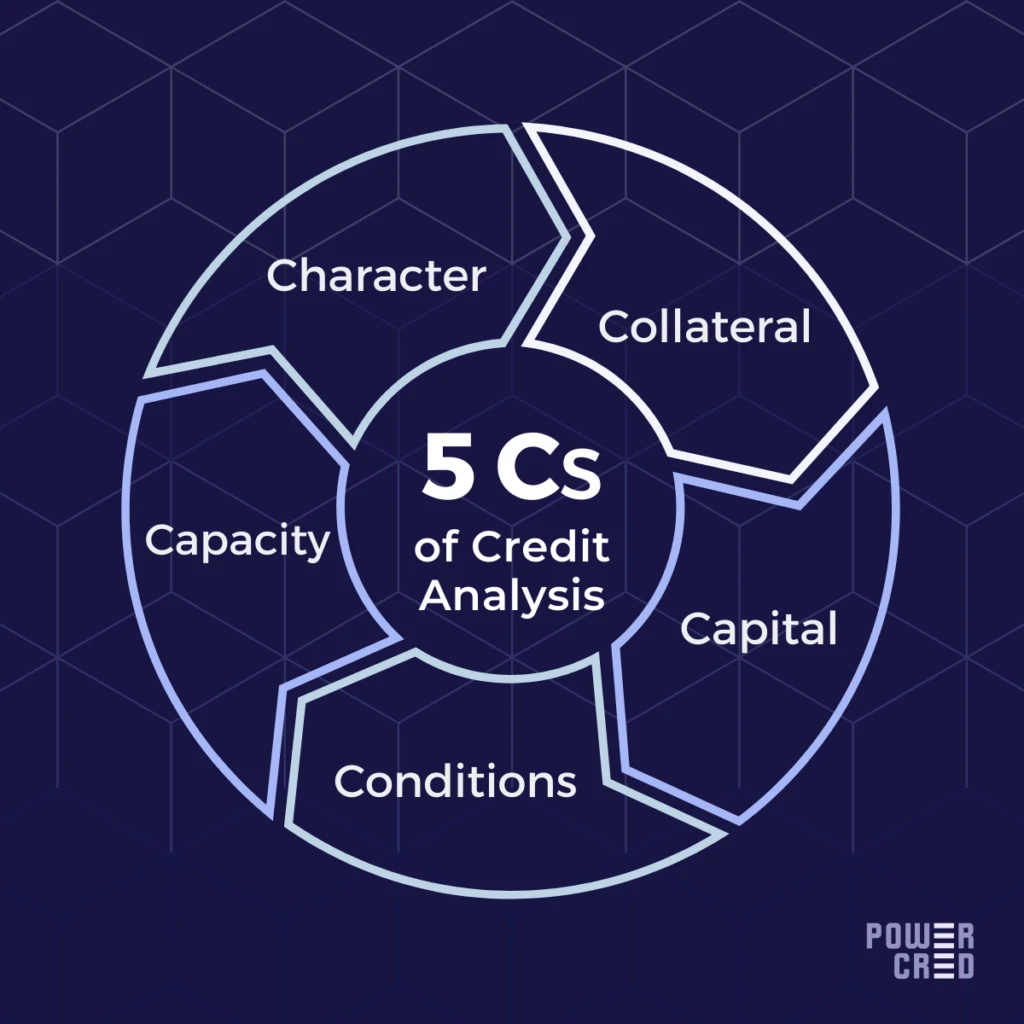The 5 Cs of Credit is a very popular system used by lenders to assess the creditworthiness of a borrower to determine loan approval, loan terms and interest rates. This system incorporates a mix of qualitative and quantitive factors for a comprehensive assessment that can help financial service providers gauge a borrower’s creditworthiness to estimate the chances of default, thereby minimising the risk of associated losses.
The 5 Cs of credit namely are Character, Capacity, Capital, Conditions and Collateral. Financial service providers typically refer to the documents, such as financial statements, submitted by the borrower at the time of loan application to assess their creditworthiness. However, to enable financial service providers to carry out an enhanced assessment of their borrowers as per the 5 Cs of Credit, PowerCred offers a plug-and-play data solution that connects financial service providers to consented data of their customers for an in-depth understanding of their behaviour and valuable insights.

Assessing Creditworthiness as per the 5 Cs of Credit with PowerCred
1. CHARACTER
A character evaluation helps lenders form an opinion regarding the trustworthiness, credibility and reliability of the borrower. A trusted and reputed borrower with a healthy credit history is more likely to repay, minimising the risk of default. Hence, Character is a factor that helps lenders understand the repayment intentions of loan applicants as well as their capability to successfully run the business that they might be taking a loan for.
How can PowerCred help assess a borrower’s character?
PowerCred offers ethically sourced data that can give the lender insights into a borrower’s reputation and credibility with access to their business reviews, customer ratings and e-commerce store ratings. For added assessment of the borrower’s credibility, PowerCred offers identity verification solutions to verify the identity details provided by the borrower.
2. CAPACITY
Borrowers’ capacity refers to their ability to repay a loan in terms of the cash flow generated by them. Lenders often evaluate the debt-to-income ratio of a business, its cash flows and future projections to understand the business health and loan repayment capacity of the business or borrower.
How can PowerCred help assess a borrower’s capacity?
PowerCred allows financial service providers to access the borrower’s consented data from multiple sources to gain an overview of the borrower’s cash flows, estimated cash flows, financial information from bank statements, e-wallets and more. Analysing such data from different sources helps financial service providers gain a comprehensive view of the borrower’s cash flows and determine whether such cash flows are healthy enough to enable loan repayment in the future.
3. CAPITAL
Capital refers to the money invested by the borrower towards the capital in the business, apart from the loan in question. Such a personal investment of the borrower in the business is seen by lenders as the borrower’s personal commitment towards the business and is linked to a higher likeliness to pay, lowering the chances of default.
How can PowerCred help assess a borrower’s capital?
PowerCred’s Bank Statement OCR can also be helpful in tracking any interest being received by the borrower as a return on capital invested in the business, indicating an investment in capital.
4. CONDITIONS
Conditions are largely the external factors that determine the success and viability of the business, which in turn will determine the loan repayment capacity of the business. Such factors include industry status (booming/declining), competition, barriers to entry, general economic conditions, political factors etc. Such factors may also include risks related to a borrower’s customers and suppliers.
How can PowerCred help assess the conditions for the loan in question?
PowerCred allows financial service providers to perform health checks on their borrower’s business to stay updated about the performance and health of the business. PowerCred also offers data points such as customer reviews, order volumes, payments received, returns and more that can help assess the business performance in the context of its customers and suppliers.
5. COLLATERAL
Collaterals are the business assets or personal assets linked to the loan application that can back as a security against the loan being given. Such collaterals may include hard assets such as real estate or other business assets such as inventory and invoices. A collateral-backed loan is considered lower on risk and is more likely to get approved by financial service providers.
How can PowerCred help assess the collaterals for the loan in question?
Accessing consented customer data from accounting systems, e-commerce platforms and bank e-statements can help financial service providers gain insights into the business inventory and invoices and their feasibility to qualify as a guarantee or security against which the loan can be approved.
PowerCred‘s data solution helps financial service providers to enhance their credit risk assessment process to make smarter lending decisions. If you’d like to know more about our solution, get in touch or book a quick demo with us.
You can also follow us on LinkedIn for the latest updates on our product, our latest news and industry insights.

